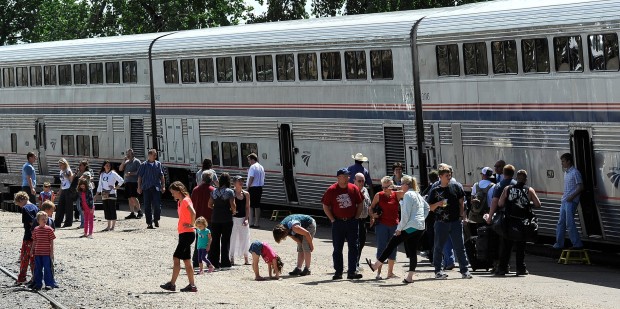The Hidden Cost of Late Trains.
This is going to seem like I’m stating the obvious, but running Amtrak trains on time is important. Late trains cost everyone money and inconvenience. And habitually late trains cost the railroad credibility and then ridership.
NARP members were recently asked to submit testimony to the Surface Transportation Board on this very subject. Since I dutifully do as I am told—an approach that works especially well around the house, by the way—my testimony went in a couple of weeks ago.

My point was simple: Amtrak’s on time performance has a significant financial impact on me personally. When planning the itinerary for my recent trip to the NARP meeting in Indianapolis, I took the Empire Builder to Chicago where I was to connect with the Cardinal from there to Indianapolis.
The Builder is due into Chicago at 3:55 p.m. and the Cardinal is scheduled to depart at 5:45. It is, in other words, a connection of not quite two hours. According to Amtrak’s official records, the Empire Builder ran on time 80.6 percent of the time for the month of December, but for the prior 12 months, it was 57.2. Given those numbers, I would be out of my mind if I tried to make that connection. So I added an extra day to my itinerary and spent the night in Chicago, catching the Cardinal the following day.
I faced the same situation on my return. After the Indianapolis meetings, my plan was to return to Chicago and connect with the California Zephyr for the ride back to the West Coast. The Cardinal is scheduled to leave Indianapolis at 6:00 a.m. and, if it’s running on time, it’s a 10:05 arrival in Chicago, leaving an hour and 55 minutes before the Zephyr departs.
But what would happen of if the Cardinal is running late? It does almost half the time based on it’s official OTP record for the past year. So I opted to overnight in Chicago again, leaving for the west coast the following day.
I do think that’s a pretty good example of how Amtrak’s On Time Performance impacts ordinary passengers. Considering hotel bills, the cost of several meals and some taxi fares, those two additional nights in Chicago probably added $600 to the overall cost of my trip.



So where are the same congressional critics with their micro-focus on costs who bullied Amtrak into denigrating its food & beverage services; yet, apparently lack the macro-focus to appreciate the higher cost to Amtrak running late trains?
As the initial agreement by the Class 1s of 1970/71 to dispatch Amtrak with priority was discarded as oil and intermodal traffic surged, Amtrak took the hit financially for at least the following areas, negating any revenue increase:
-T&E and OBS crew overtime; transportation to pick-up T&E crews “dead” on hours worked; to bring in fresh crews somewhere en route; crew exhaustion/call-offs; insufficient crew protect.
-Shortage of consists to cover late trains; inability to maintain consists in yards during brief layovers.
-Charter bus and hotel costs for broken connections.
-Worst possible PR for Amtrak to project; how many travelers or people meeting very late trains swore off Amtrak?
In 2013, I traveled four times just on the “Empire Builder;” we averaged 5-8 hours late in each direction. This is just plain not acceptable; nor is the STB’s inability to understand the importance of on-time (or, no more than 15 minutes off) at every single stop en route, as well as at end points. How long would these Class 1 private freight railroads hold a contract with, for example, UPS, if this was their definition for the on-time performance of the time-sensitive “Z” trains?
Amtrak, passenger rail advocates, and whatever media is left not dependent upon lobbyist pandering must draw a “red line” to prevent this water-boaridng of Amtrak, as without any schedule reliability, what is the point of having a schedule, other than to identify stops for food en route..?